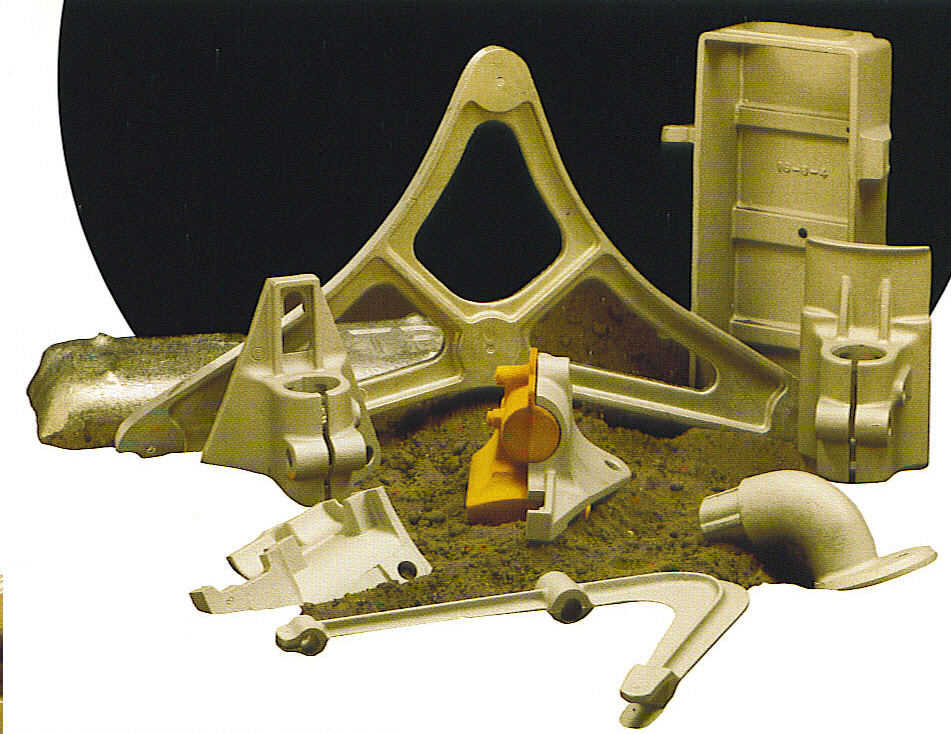All About Aluminum Castings Company
Table of ContentsThe Ultimate Guide To Aluminum Castings CompanySome Known Details About Aluminum Castings Company Not known Incorrect Statements About Aluminum Castings Company How Aluminum Castings Company can Save You Time, Stress, and Money.Aluminum Castings Company for BeginnersSome Of Aluminum Castings CompanyGetting The Aluminum Castings Company To Work7 Easy Facts About Aluminum Castings Company Described
There are 2 key sorts of die casting utilized in the aluminum casting industry: warm chamber pass away spreading and cool chamber die casting. The main distinction in between these approaches is how the molten metal is delivered to the mold. In warm chamber pass away spreading, frequently made use of for reduced melting point metals, the melting pot is straight connected to the machine, and a plunger forces the product through a gooseneck right into the die tooth cavity.
Getting My Aluminum Castings Company To Work
In these methods, the mold and mildew is deliberately destroyed or broken away in order to extract the finished aluminum spreading. Usual processes under the group of expendable mold spreading consist of (financial investment spreading),,, and financial investment casting. When manufacturing custom-made light weight aluminum parts utilizing expendable mold and mildews, suppliers pour liquified aluminum or aluminum alloys right into the mold, which is then broken apart to launch the solidified metal component.
The is one of the earliest and most extensively previously owned types of aluminum spreading. It entails compacting specialized factory sand, usually strengthened with clay or resin, around an exactly crafted reusable pattern that establishes the shape and internal details of the completed aluminum item. The pattern system integrates risers and vents to manage the flow of molten steel and to stop casting problems such as contraction porosity.
Aluminum Castings Company - An Overview

This mold is then preheated prior to the putting of molten light weight aluminum or aluminum alloy. As the steel fills up the shell, it records the detailed details and fine surface area finish of the mold and mildew. When cooled, the ceramic is mechanically or chemically escaped, permitting for the removal and splitting up of private cast parts.
Aluminum Castings Company for Beginners
Irreversible mold and mildew spreading uses reusable metal mold and mildews and is optimal for mass production with consistent quality and much less waste. Expendable mold and mildew spreading utilizes single-use mold and mildews, like sand or foam, using layout versatility and lower tooling expenses for models or brief runs. Die spreading is best for creating high volumes of light weight aluminum parts that need limited resistances, great information, and smooth surfaces.
The Toshiba Equipment DC-J Series includes die casting makers appropriate for light weight aluminum. Known for their robust building and high injection efficiency, these equipments make sure efficient and precise casting (Metal Castings).

While light weight aluminum can be made use of in its pure form, it is frequently alloyed with various other metals to enhance its buildings or the residential properties of the other metals. These alloys offer enhanced performance for various applications. Aluminum alloys are classified into 8 series, phoned number from one to 8. The imp source very first number(s) of the number show the main alloying element combined with light weight aluminum.
What Does Aluminum Castings Company Do?
This alloying improves the stamina and hardness of light weight aluminum yet lowers its ductility and deterioration resistance. The 3000 series alloys are primarily alloyed with manganese.
The 4000 series alloys are alloyed with silicon, which lowers the melting factor and boosts fluidness. This makes it a popular option for casting, as it is simple to form in its liquified state.
Not known Factual Statements About Aluminum Castings Company
This series is categorized as a high-strength alloy, particularly fit for sheet and plate applications because of its exceptional weldability. Its resistance to rust from acids and alkalis makes it excellent for use in harsh and hostile settings (Sand Foundry). The 6000 series alloys are alloyed with both magnesium and silicon, supplying a balance of toughness, mechanical residential properties, and deterioration resistance
Processing the 6000 series needs specialized and sophisticated tools, which can be intricate and expensive. However, this collection is known for its outstanding corrosion and oxidation resistance, as well as its simplicity of coating, treatment, and workability. The 7000 collection light weight aluminum alloys are the greatest and most durable amongst light weight aluminum types, with toughness similar to about two-thirds of industrial-grade A3 steel.
Not known Details About Aluminum Castings Company
Zinc is the key alloying aspect in the 7000 collection, boosting the solidity of the aluminum, despite the fact that zinc's hardness resembles that of aluminum on the Mohs scale. The 8000 collection aluminum alloys are mostly alloyed with tin, in addition to small quantities of copper and nickel (Aluminum Sand Castings). While these alloys offer lower stamina contrasted to various other series, they stand out in machinability and use resistance
Light weight aluminum cast heatsinks are electrically conductive, enabling them to be grounded effectively. They are frequently cast with incorporated features that lessen the demand for secondary procedures, such as additional machining or assembly, bring about further cost financial savings. Light weight aluminum casting is regularly made use of to manufacture brackets for both heavy-duty industrial equipment and house appliances.
Aluminum Castings Company Can Be Fun For Everyone
The single-piece building of light weight aluminum braces enhances their stamina and resilience, minimizing the possibility of failing. If holes are needed, they can be included directly in the casting mold, reducing the need for post-production ending up (https://www.pinterest.com/pin/1091630397193189955). Manufacturers have increasingly adopted aluminum spreading for golf devices as a result of its durability, security, and flexibility in shaping